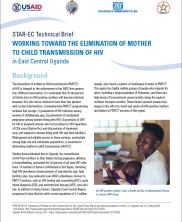The prevention of mother-to-child transmission (PMTCT) of HIV is integral to the achievement of an AIDS-free generation. Without intervention, it is estimated that 25-40 percent of infants born to HIV-positive mothers will become infected. Studies have estimated that in Uganda, the transmission of HIV from mothers to their babies during pregnancy, delivery, or breastfeeding, accounted for 18 percent of all new HIV infections. A number of factors contributed to this figure, including high HIV prevalence among women of reproductive age, high fertility rates, low antenatal care (ANC) attendance. Access to PMTCT services, such as HIV testing and counseling (HTC), early infant diagnosis (EID), and antiretroviral therapy (ART), was also low.
STAR-EC, in collaboration with the Ministry of Health (MOH), has supported the implementation and scale up of high quality, sustainable, PMTCT interventions in Uganda’s East Central Region since 2009. STAR-EC introduced and scaled up a range of PMTCT interventions at all levels of service delivery. Aligned with the four-pronged PMTCT strategy, the goal was to increase demand for and availability of HIV prevention, ANC, and PMTCT services. STAR-EC, JSI, 2016


